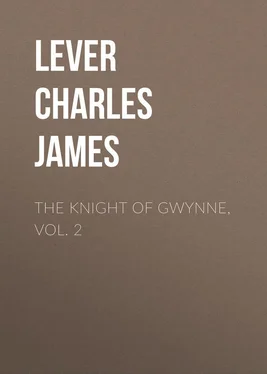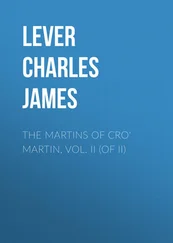Charles Lever - The Knight Of Gwynne, Vol. 2
Здесь есть возможность читать онлайн «Charles Lever - The Knight Of Gwynne, Vol. 2» — ознакомительный отрывок электронной книги совершенно бесплатно, а после прочтения отрывка купить полную версию. В некоторых случаях можно слушать аудио, скачать через торрент в формате fb2 и присутствует краткое содержание. Жанр: foreign_antique, foreign_prose, на английском языке. Описание произведения, (предисловие) а так же отзывы посетителей доступны на портале библиотеки ЛибКат.
- Название:The Knight Of Gwynne, Vol. 2
- Автор:
- Жанр:
- Год:неизвестен
- ISBN:нет данных
- Рейтинг книги:4 / 5. Голосов: 1
-
Избранное:Добавить в избранное
- Отзывы:
-
Ваша оценка:
- 80
- 1
- 2
- 3
- 4
- 5
The Knight Of Gwynne, Vol. 2: краткое содержание, описание и аннотация
Предлагаем к чтению аннотацию, описание, краткое содержание или предисловие (зависит от того, что написал сам автор книги «The Knight Of Gwynne, Vol. 2»). Если вы не нашли необходимую информацию о книге — напишите в комментариях, мы постараемся отыскать её.
The Knight Of Gwynne, Vol. 2 — читать онлайн ознакомительный отрывок
Ниже представлен текст книги, разбитый по страницам. Система сохранения места последней прочитанной страницы, позволяет с удобством читать онлайн бесплатно книгу «The Knight Of Gwynne, Vol. 2», без необходимости каждый раз заново искать на чём Вы остановились. Поставьте закладку, и сможете в любой момент перейти на страницу, на которой закончили чтение.
Интервал:
Закладка:
The curiosity to know the exact words the paper contained was meanwhile extreme, and a thousand absurd versions gained currency; for, in the absence of all fact, invention was had recourse to. “Young Darcy is here, – he was seen this morning on the mail, – it was he himself gave the letter.” Such were among the rumors around; while Con Hefferman, coolly tapping his snuff-box, asked one of the lawyers near him, but in a voice plainly audible on either side, “I hope our friend Bagenal Daly is well; have you seen him lately?”
From that moment an indistinct murmur ran through the crowd that it was Daly had come back to “the West” to challenge the bar, and the whole bench, if necessary. Many added that there could no longer be any doubt of the fact, as Mr. Heffernan had seen and spoken to him.
Order was at last restored; but so completely had this new incident absorbed all the interest of the trial, that already the galleries began to thin, and of the great crowd that filled the body of the court, many had taken their departure. The Counsellor arose, agitated and evidently disconcerted, to finish his task: he spoke, indeed, indignantly of the late attempt to coerce the free expression of the advocate “by a brutal threat;” but the theme seemed one he felt no pleasure in dwelling upon, and he once more addressed himself to the facts of the case.
The judge charged briefly; and the jury, without retiring from the box, brought in a verdict for Hickman O’Reilly.
When the judges retired to unrobe, a messenger of the court summoned O’Halloran to their chamber. His absence was very brief; but when he returned his face was paler, and his manner more disturbed than ever, notwithstanding an evident effort to seem at ease and unconcerned. By this time Hickman O’Reilly had arrived in the town, and Heffernan was complimenting the Counsellor on the admirable display of his speech.
“I regret sincerely that the delicate nature of the position in which I stood prevented my hearing you,” said O’Reilly, shaking his hand.
“You have indeed had a great loss,” said Heffernan; “a more brilliant display I never listened to.”
“Well, sir,” interposed the little priest of Curraghglass, who, not altogether to the Counsellor’s satisfaction, had now slipped an arm inside of his, “I hope the evil admits of remedy; Mr. O’Halloran intends to address a few words to the people before he leaves the town.”
Whether it was the blank look that suddenly O’Reilly’s features assumed, or the sly malice that twinkled in Heffernan’s gray eyes, or that his own feelings suggested the course, but the Counsellor hastily whispered a few words in the priest’s ear, the only audible portion of which was the conclusion: “Be that as it may, I ‘ll not do it.”
“I ‘m ready now, Mr. O’Reilly,” said he, turning abruptly round.
“My father has gone over to say good-bye to the judges,” said Beecham; “but I’ll drive you back to the abbey, – the carriage is now at the door.”
With a few more words in a whisper to the priest, O’Halloran moved on with young O’Reilly towards the door.
“Only think, sir,” said Father John, dropping behind with Heffernan, from whose apparent intimacy with O’Halloran he augured a similarity of politics, “it is the first time the Counsellor was ever in our town, the people have been waiting since two o’clock to hear him on the ‘veto,’ – sorra one of them knows what the same ‘veto’ is, – but it will be a cruel disappointment to see him leave the place without so much as saying a word.”
“Do you think a short address from me would do instead?” said Heffernan, slyly; “I know pretty well what’s doing up in Dublin.”
“Nothing could be better, sir,” said Father John, in ecstasy; “if the Counsellor would just introduce you in a few words, and say that, from great fatigue, or a sore throat, or anything that way, he deputed his friend Mr. – ”
“Heffernan’s my name.”
“His friend Mr. Heffernan to state his views about the ‘veto,’ – mind, it must be the ‘veto,’-you can touch on the reform in Parliament, the oppression of the penal laws, but the ‘veto’ will bring a cheer that will beat them all.”
“You had better hint the thing to the Counsellor,” said Heffernan; “I am ready whenever you want me.”
As the priest stepped forward to make the communication to O’Halloran, that gentleman, leaning on Beecham O’Reilly’s arm, had just reached the steps of the courthouse, where now a considerable police-force was stationed, – a measure possibly suggested by O’Reilly himself.
The crowd, on catching sight of the Counsellor, cheered vociferously; and, although they were not without fears that he intended to depart without speaking, many averred that he would address them from the carriage. Before Father John could make known his request, a young man, dressed in a riding-costume, burst through the line of police, and, springing up the steps, seized O’Halloran by the collar.
“I gave you a choice, sir,” said he, “and you made it;” and at the same instant, with a heavy horsewhip, struck him several times across the shoulders, and even the face. So sudden was the movement, and so violent the assault, that, although a man of great personal strength, O’Halloran had received several blows almost before he could defend himself, and when he had rallied, his adversary, though much lighter and less muscular, showed in skill, at least, he was his superior. The struggle, however, was not to end here; for the mob, now seeing their favorite champion attacked, with a savage howl of vengeance dashed forward, and the police, well aware that the youth would be torn limb from limb, formed a line in front of him with fixed bayonets. For a few moments the result was doubtful; nor was it until more than one retired into the crowd bleeding and wounded, that the mob desisted, or limited their rage to yells of vengeance.
Meanwhile the Counsellor was pulled back within the court-house by his companions, and the young man secured by two policemen, – a circumstance which went far to allay the angry tempest of the people without.
As, pale and powerless from passion, his livid cheek marked with a deep blue welt, O’Halloran sat in one of the waiting-rooms of the court, O’Reilly and his son endeavored, as well as they could, to calm down his rage; expressing, from time to time, their abhorrence of the indignity offered, and the certain penalty that awaited the offender. O’Halloran never spoke; he tried twice to utter something, but the words died away without sound, and he could only point to his cheek with a trembling finger, while his eyes glared like the red orbs of a tiger.
As they stood thus, Heffernan slipped noiselessly behind O’Reilly, and said in his ear, —
“Get him off to the abbey; your son will take care of him. I have something for yourself to hear.”
O’Reilly nodded significantly, and then, turning, said a few words in a low, persuasive tone to O’Halloran, concluding thus: “Yes, by all means, leave the whole affair in my hands. I ‘ll have no difficulty in making a bench. The town is full of my brother magistrates.”
“On every account I would recommend this course, sir,” said Heffernan, with one of those peculiarly meaning looks by which he so well knew how to assume a further insight into any circumstance than his neighbors possessed.
“I will address the people,” cried O’Halloran, breaking his long silence with a deep and passionate utterance of the words; “they shall see in me the strong evidence of the insolent oppression of that faction that rules this country; I ‘ll make the land ring with the tyranny that would stifle the voice of justice, and make the profession of the bar a forlorn hope to every man of independent feeling.”
Читать дальшеИнтервал:
Закладка:
Похожие книги на «The Knight Of Gwynne, Vol. 2»
Представляем Вашему вниманию похожие книги на «The Knight Of Gwynne, Vol. 2» списком для выбора. Мы отобрали схожую по названию и смыслу литературу в надежде предоставить читателям больше вариантов отыскать новые, интересные, ещё непрочитанные произведения.
Обсуждение, отзывы о книге «The Knight Of Gwynne, Vol. 2» и просто собственные мнения читателей. Оставьте ваши комментарии, напишите, что Вы думаете о произведении, его смысле или главных героях. Укажите что конкретно понравилось, а что нет, и почему Вы так считаете.












